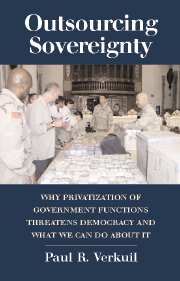 Outsourcing Sovereignty
Outsourcing Sovereignty Book contents
- Frontmatter
- Contents
- Acknowledgments
- Chart
- 1 Introduction and Overview – Why Outsourcing Threatens Democracy
- 2 The Outsourcing of Sovereignty
- 3 Case Study: Public and Private Approaches to Transportation Security
- 4 The Public-Private Distinction
- 5 The Case for Constitutional Governance
- 6 Statutory and Administrative Limitations on Private Delegations
- 7 Outsourcing Government Services: Contract Theory and Practice
- 8 Structural Reforms to Government
- 9 Conclusions (Wherein the Principal Instructs Her Agents)
- Cases
- Bibliography
- Index
5 - The Case for Constitutional Governance
Published online by Cambridge University Press: 27 July 2009
- Frontmatter
- Contents
- Acknowledgments
- Chart
- 1 Introduction and Overview – Why Outsourcing Threatens Democracy
- 2 The Outsourcing of Sovereignty
- 3 Case Study: Public and Private Approaches to Transportation Security
- 4 The Public-Private Distinction
- 5 The Case for Constitutional Governance
- 6 Statutory and Administrative Limitations on Private Delegations
- 7 Outsourcing Government Services: Contract Theory and Practice
- 8 Structural Reforms to Government
- 9 Conclusions (Wherein the Principal Instructs Her Agents)
- Cases
- Bibliography
- Index
Summary
The buck stops here.
– Harry S TrumanOur structural Constitution is all about governance or, more precisely, democratic governance, as Justice Breyer has recently reminded us. This insight vindicates the “We the People” view of sovereignty. The People, by delegating her sovereign powers to the political branches, expects democratic governance. The Constitution was designed to provide it. And chief executives like the redoubtable Harry Truman understood how to implement it.
Separation of powers helps to ensure democratic governance by assigning duties to separate political branches, and by preventing those branches from transferring or reassigning those duties. Much of the duty to govern is assigned to the Executive under Article II. The Executive power and the Commander-in-Chief power ensure that the military remains subject to civilian control. Other clauses ensure executive control of the administration. The president does not act alone, of course; he works through a network of constitutionally defined deputies.
These officials, designated “Officers of the United States” under Article II, conduct all significant public duties not performed directly by the president. Presidential control of these officers is ensured through the ability to require “the Opinion, in writing, of the principal Officer in each of the executive Departments.” And the president's duty to “take Care that the Laws be faithfully executed” is a constitutional obligation. Like the oath itself, it is a promise to Congress and the people that the laws (including the Constitution) will be defended and enforced. The president is the Constitution's most duty-bound actor.
- Type
- Chapter
- Information
- Outsourcing SovereigntyWhy Privatization of Government Functions Threatens Democracy and What We Can Do about It, pp. 102 - 120Publisher: Cambridge University PressPrint publication year: 2007


